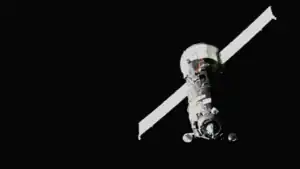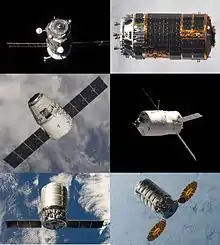 Progress MS-23 approaching the ISS | |
| Names | Progress 84P |
|---|---|
| Mission type | ISS resupply |
| Operator | Roscosmos |
| COSPAR ID | 2023-071A |
| SATCAT no. | 56740 |
| Mission duration | 188 days, 22 hours and 6 minutes |
| Spacecraft properties | |
| Spacecraft | Progress MS-23 no.453 |
| Spacecraft type | Progress MS |
| Manufacturer | Energia |
| Launch mass | 7000 kg |
| Start of mission | |
| Launch date | 24 May 2023, 12:56 UTC |
| Rocket | Soyuz-2.1a |
| Launch site | Baikonur, Site 31 |
| Contractor | Progress Rocket Space Centre |
| End of mission | |
| Disposal | Deorbited |
| Decay date | 29 November 2023, 11:02 UTC |
| Orbital parameters | |
| Reference system | Geocentric orbit |
| Regime | Low Earth orbit |
| Inclination | 51.65° |
| Docking with ISS | |
| Docking port | Poisk zenith |
| Docking date | 24 May 2023, 16:19 UTC |
| Undocking date | 29 November 2023, 07:55 UTC |
| Time docked | 188 days, 15 hours and 36 minutes |
Progress ISS Resupply | |
Progress MS-23 (Russian: Прогресс МC-23), Russian production No.453, identified by NASA as Progress 84P, is a Progress spaceflight launched by Roscosmos to resupply the International Space Station (ISS). It is the 176th flight of a Progress spacecraft.
History
The Progress-MS is an uncrewed freighter based on the Progress-M featuring improved avionics. This improved variant first launched on 21 December 2015. It has the following improvements:[1][2][3][4]
- New external compartment that enables it to deploy satellites. Each compartment can hold up to four launch containers. First time installed on Progress MS-03.
- Enhanced redundancy thanks to the addition of a backup system of electrical motors for the docking and sealing mechanism.
- Improved Micrometeoroid (MMOD) protection with additional panels in the cargo compartment.
- Luch Russian relay satellites link capabilities enable telemetry and control even when not in direct view of ground radio stations.
- GNSS autonomous navigation enables real time determination of the status vector and orbital parameters dispensing with the need of ground station orbit determination.
- Real time relative navigation thanks to direct radio data exchange capabilities with the space station.
- New digital radio that enables enhanced TV camera view for the docking operations.
- Unified Command Telemetry System (UCTS) replaces previous Ukrainian Chezara Kvant-V as the Progress spacecraft's on-board radio and antenna/feeder system.
- Replacement of the Kurs A with Kurs NA digital system.
Launch
A Soyuz-2.1a with Progress MS-23 to the International Space Station from Baikonur Site 31 launched on 24 May 2023 at 12:56 UTC[5][6][7][8][9] supporting Expedition 69 and Expedition 70 missions aboard the ISS. It docked the same day.[9]
Cargo
The MS-23 cargo capacity is approximately 2,500 kg (5,500 lb) as follows:[9][10]
- Dry cargo: 1,290 kg (2,840 lb)
- Fuel: 499 kg (1,100 lb)–600 kg (1,300 lb)
- Oxygen: 40 kg (88 lb)
- Water: 630 kg (1,390 lb)
See also
References
- ↑ Krebs, Gunter (1 December 2015). "Progress-MS 01-19". Gunter's Space Page. Retrieved 3 October 2020.
- ↑ "Progress MS-20". NSSDCA. NASA. 10 February 2021. Retrieved 2 April 2021.
 This article incorporates text from this source, which is in the public domain.
This article incorporates text from this source, which is in the public domain. - ↑ Zak, Anatoly. "Progress-MS cargo ship series". RussianSpaceWeb. Retrieved 3 October 2020.
- ↑ Blau, Patrick (1 December 2015). "Progress MS Spacecraft". Spaceflight101. Retrieved 17 November 2020.
- ↑ "Россия отправит к МКС пять кораблей в 2022 году" [Russia will send five ships to the ISS in 2022]. RIA Novosti (in Russian). 29 September 2021. Retrieved 29 September 2021.
- ↑ "FY 2022 Congressional Justification NASA Budget Request – Crew and Cargo Program – Project Schedule" (PDF). NASA. 28 May 2021. p. 225 (SO-30). Retrieved 11 August 2021.
- ↑ Zak, Anatoly (9 February 2021). "ISS set for the Russian expansion". RussianSpaceWeb. Retrieved 2 April 2021.
- ↑ Zak, Anatoly (3 February 2021). "Planned Russian space missions in 2022". RussianSpaceWeb. Retrieved 2 April 2021.
- 1 2 3 Graham, William (24 May 2023). "Russia's Progress MS-23 resupply mission arrives at space station". NASASpaceFlight.com. Retrieved 7 October 2023.
- ↑ "Progress MS-23 to resupply ISS". Retrieved 7 October 2023.
